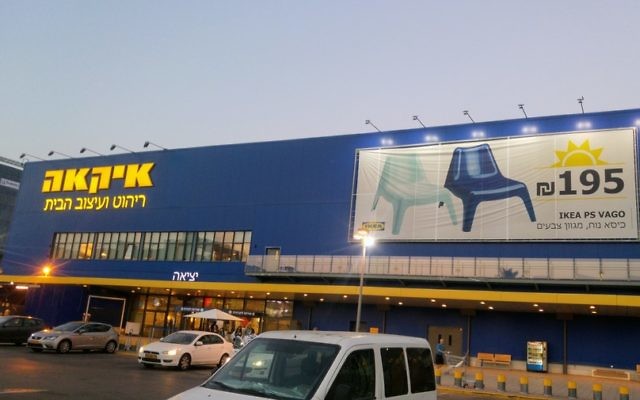Learning a valuable lesson from IKEA
Why the Netanya branch of flatpack furniture giant IKEA, which has its own shule, is a metaphor for the Jewish State.
ENTERING any branch of IKEA, anywhere in the world, feels like going through a magical portal into one single universal store.
Aside from the prices in local currency, every IKEA has the identical furniture for sale, with the identical peculiar Swedish names, the same shelves in the warehouse, the same signs and even the same food in the restaurant.
On a recent visit to Israel, we were able to confirm that walking into the Netanya IKEA takes one through the portal to an exact copy of every other branch. Yet this one is different.
It’s not just the Swedish transliterated into Hebrew, or the kashrut certificate that accompanies the food. It’s that buried deep inside this IKEA is a feature unique to the Israeli version – a shule.
This facility, fully equipped with siddurim and all other necessary accoutrements, provides the opportunity to pray for one’s spiritual needs before paying for the physical ones (and contains the only furniture in the store that is not made by IKEA – the Ark of the Torah is not assembled from a flatpack).
This shule may be unique for IKEA, but is far from uncommon in Israel. Synagogues are to be found in shopping malls and markets, train and bus stations, airports, hospitals and various other public areas. Many a commuter will plan their journey to incorporate afternoon prayers while changing buses or taking a break from buying vegetables.
And so the Israeli IKEA, same but different, is an example of the reality of Israel. Indeed it is a perfect metaphor for the state as we prepare to celebrate its 70 years of existence. No longer a country of pioneering swamp-drainers and road-builders, Israel can take its place amongst the nations as a modern, developed society with the same benefits of globalisation as any other first world state.
But there’s always a difference. IKEA has a shule in its midst. Israel has a Jewish heart.
This “same but different” motif exists throughout Israeli life. The vernacular is Hebrew, connecting all who speak it to the words of the prophets, prayers and rabbinical texts stretching back four millennia (and making those texts as accessible today as any paperback).
Theodor Herzl believed few in the state that he envisioned would be able “to order a train ticket in Hebrew” and assumed that the Jewish state, like so many other emergent countries, would adopt someone else’s language, such as German. But he was mistaken. Israel was to be different.
The Israeli army fulfils the same role as any other nation’s defence forces (though, sadly, is tested by more enemies than most other armies have to combat) but it too has a difference. No other army separates milk and meat. No other army checks carefully which operations are permitted on Shabbat. And no other army moves faster than the IDF to get to the scene of natural disasters worldwide, to set up hospitals, to search through rubble, to save lives. This is a Jewish army.
It is fitting that Jerusalem is the capital of Israel, and not just because of a 3000-year old historical reality, as President Trump has recently acknowledged, but because Jerusalem is a city that lives simultaneously on two planes. It is a thriving, fast-growing city, with modern transport and infrastructure, and a burgeoning high-tech sector.
Yet yeshivot and study halls nestle amongst the offices; buses are filled with citizens on their way to work or prayer, or both. And by the centre of modern Jerusalem rests the Old City, which since 1967 has given the city its heart, and at the heart within that heart lie the Kotel and the Temple Mount, sacred and sensitive, the site of the strongest connection between humanity and divinity.
If the streets are the arteries of Jerusalem, a spirit of holiness is pumped through her veins. Like every other capital city, but different.
The early Zionists, like their successors today, had different visions of what Zionism was, and what a “Jewish state” would mean. These visions ranged from a secular state that would be cleansed of Judaism, a relic of the Diaspora, allowing Jews to be exactly like the other nations, to a realisation of the Torah’s messianic vision of a society governed by Jewish laws and values.
Seventy years on, neither vision has been fulfilled, as each has had to make room for the other. And yet, perhaps miraculously, both have in some ways been fully achieved; the Zionist movement has allowed Jews to return to normality, to be citizens of a country that is their own. Simultaneously, Israel is permeated by Jewish values; Jewish law informs the institutions and much of the life of the State. Sometimes it even shines as a light to the nations.
The arguments in the early days of Zionism were fierce and Israeli politicians today continue that tradition. The line between “a Jewish state” and a “state for the Jews” will continue to be debated and contested, as that line itself moves back and forth.
But we can be sure that, just as the Israeli IKEA shul gives the store a unique character, so too the State of Israel will always be uniquely distinguished by its Jewish soul.
RABBI JAMES KENNARD is principal of Mount Scopus Memorial College.


comments